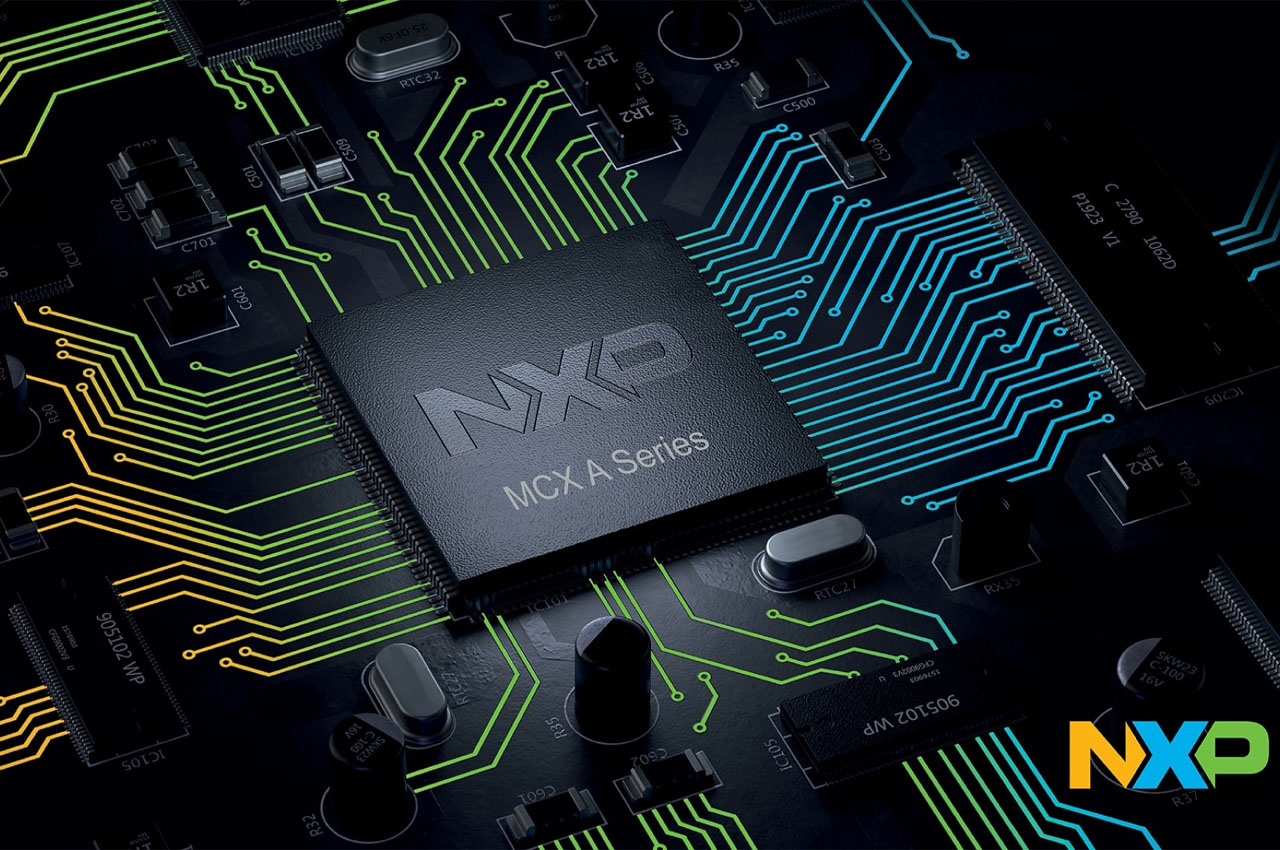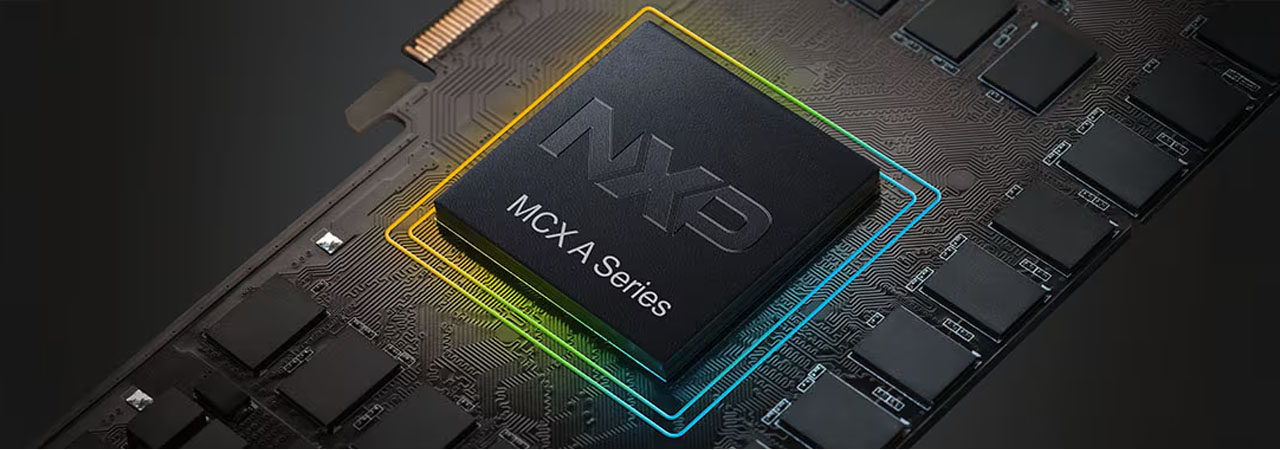The MCX A345/A346 belong to NXP’s high-performance mixed-signal MCX A34 family of general-purpose microcontrollers, built around an Arm Cortex-M33 core clocked at up to 180 MHz, offering up to 1 MB of Flash memory (with ECC support) and 256 kB of RAM (including a cache with ECC options). They include a Math Acceleration Unit (MAU)—ideal for fast trigonometric, reciprocal, square root, sine/cosine, and arctan computations—and a SmartDMA co-processor to offload tasks like parallel camera interfacing and keypad scanning.
These MCUs are richly endowed with analogue and timing peripherals: four 16-bit ADCs (up to 3.2 Msps in 16-bit or 4 Msps in 12-bit mode, with potentially up to 82 input channels depending on package), a 12-bit DAC (1 Msps), three high-speed comparators (one functional in deep power-down), and four OPAMPs (without PGA).
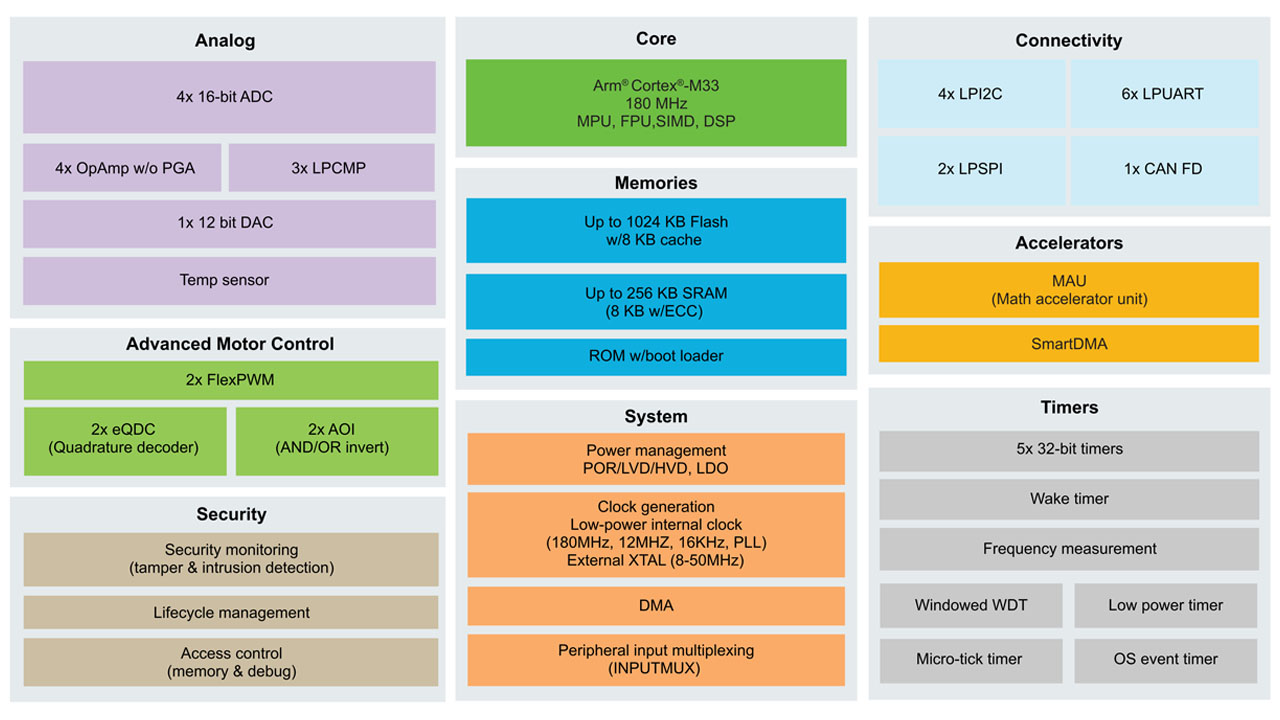
The device also integrates two FlexPWM modules (each with four submodules)—important for motor control applications—alongside a wide range of communication interfaces (including multiple UARTs, I²C, SPI, plus CAN with CAN-FD on MCX A34). The MCX A series emphasises scalability, power efficiency, and autonomous low-power peripheral operation, all supported via the MCUXpresso Developer Experience for streamlined development.
In terms of typical applications, these MCUs are especially tailored for motor control (like BLDC or PMSM), industrial and consumer IoT, HVAC systems, and any edge computing scenario demanding fast math, rich analogue sensing, and efficient peripheral handling. The combination of high-speed analogue capabilities, the MAU, SmartDMA, and power-efficient modes renders them ideal for responsive, low-power embedded systems.
MCX A34 Mixed-Signal Microcontrollers Specifications:
- CPU: Arm Cortex-M33 core @ up to 180 MHz with TrustZone
- Processing Accelerators:
- Math Acceleration Unit (MAU) – supports trigonometric, reciprocal, square, square root, sine, cosine, and arctan algorithms
- SmartDMA co-processor – handles tasks like parallel camera interface and keypad scanning
- Memory:
- Up to 1024 KB single-bank Flash with ECC (1-bit correction, 2-bit detection)
- Up to 256 KB RAM (8 KB shared with cache), with optional ECC
- 8 KB cache RAM
- RAM retention down to deep power-down mode
- Integrated ROM
- Analogue Peripherals:
- 4 × 16-bit ADCs (up to 3.2 Msps in 16-bit, 4 Msps in 12-bit mode)
- Up to 82 ADC input channels (package dependent)
- Integrated temperature sensor
- 1 × 12-bit DAC (up to 1 Msps)
- 3 × high-speed comparators (with internal 8-bit DAC reference)
- 1 × LPCMP functional in deep power-down mode
- 4 × OPAMPs (without PGA)
- Timers:
- 5 × 32-bit general-purpose timers/counters (capture, compare, PWM, DMA request support)
- Low-power timer
- Frequency measurement timer
- Windowed watchdog timer
- Wake timer
- Microtick timer (UTICK)
- OS event timer
- RTC timer (no external 32 kHz required)
- Connectivity:
- 2 × LPSPI
- 4 × LPI²C
- 6 × LPUART
- 1 × FlexCAN with FD
- Security:
- 128-bit UUID per device (IETF RFC4122 v5 compliant)
- Device lifecycle management
- Flash read/write/execute protection (MBC and lockable)
- Implicit-protected flash region (IFR)
- Security monitoring features
- Code Watchdog for flow integrity
- Glitch attack-resistant Glikey for secure register access
- 6 × passive anti-tamper detection
- Packaging Options:
- WFBGA169 (7×7 mm)
- LQFP144 (20×20 mm)
- LQFP100 (14×14 mm)
- LQFP64 (10×10 mm)
- Operating voltage: 1.7 V to 3.6 V
- Operating Temperature: –40°C to +125°C
The MCX-A345/A346 microcontrollers are supported by NXP’s MCUXpresso ecosystem, which provides an IDE, SDK, configuration tools, middleware, and drivers. Developers can also use the MCX-MC SDK for fast motor control development and eIQ tools for edge AI. Zephyr RTOS support and optimised libraries further simplify building applications in motor control, HVAC, industrial, and IoT.
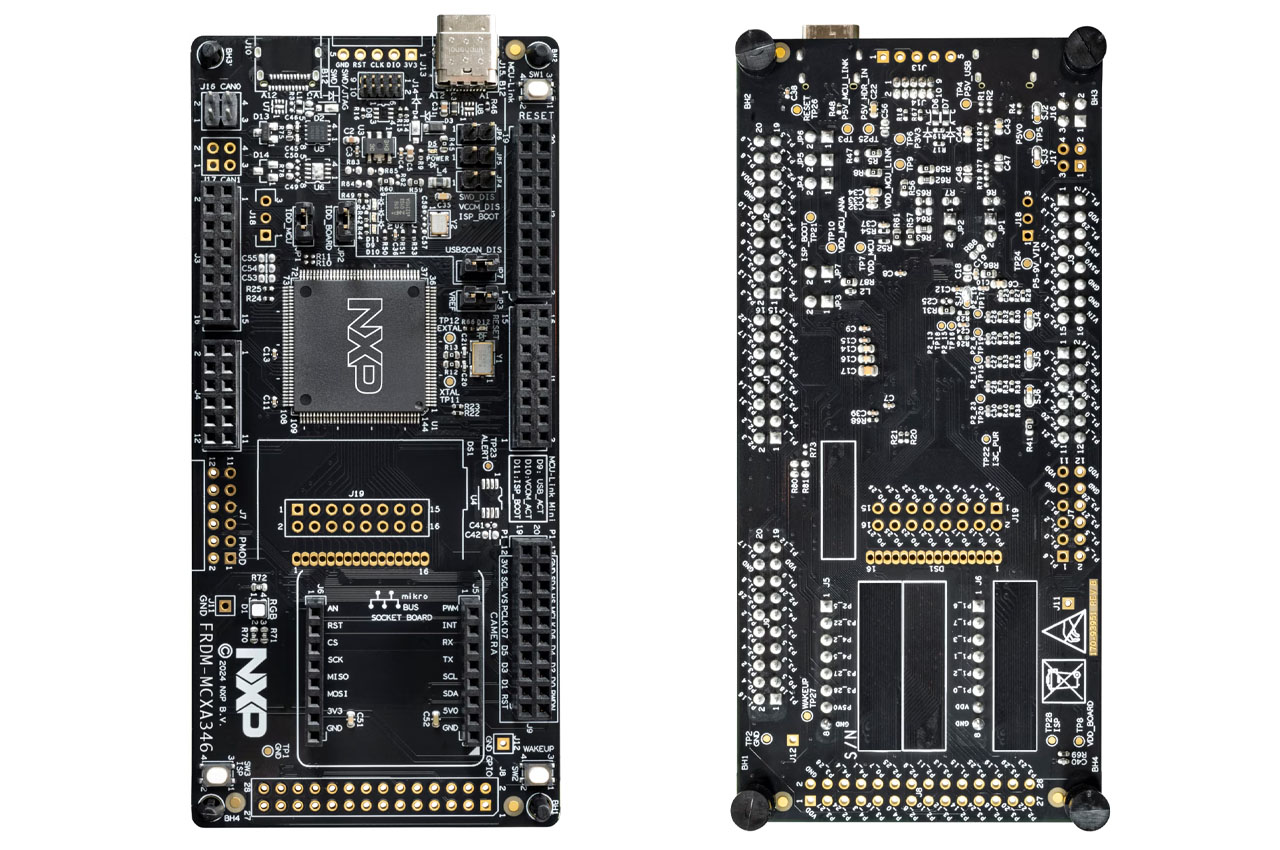
On the other hand, the company has also developed the FRDM-MCXA346 development board for NXP’s MCX A345/A346 Cortex-M33 MCUs, featuring Arduino, FRDM, mikroBUS, and Pmod headers for easy expansion, plus onboard CAN-FD, I²C, SPI, UART, I3C, Wi-Fi, and camera interface. It includes up to 1 MB Flash, 256 KB RAM, a Math Acceleration Unit, SmartDMA, and an MCU-Link debugger for simplified prototyping. Supported by the MCUXpresso ecosystem, it targets motor control (BLDC, PMSM), HVAC, industrial drives, IoT devices, and health monitoring applications.
FRDM-MCXA346 development board Specifications:
- Microcontroller: NXP MCX A346, Arm Cortex-M33 core @ up to 180 MHz
- Up to 1 MB Flash with 256 KB RAM (with ECC)
- Math Acceleration Unit (MAU) and SmartDMA co-processor
- CAN-FD, LPUART, LPSPI, LPI2C, DMA, LDO regulator
- Connectivity:
- High-speed USB Type-C (onboard MCU-Link debugger)
- CAN, I3C, SPI, I²C, UART through expansion headers
- Wi-Fi connector (Arduino/PMOD/mikroBUS, DNP)
- Camera connector (via SmartDMA)
- Debugger: Onboard MCU-Link debugger with CMSIS-DAP; JTAG/SWD connector
- Expansion options: Arduino header, FRDM header, Pmod (DNP), mikroBUS, SmartDMA/camera header, GPIO1 & GPIO2 headers
- User interface: RGB LED, Reset button, ISP button, Wake-up button
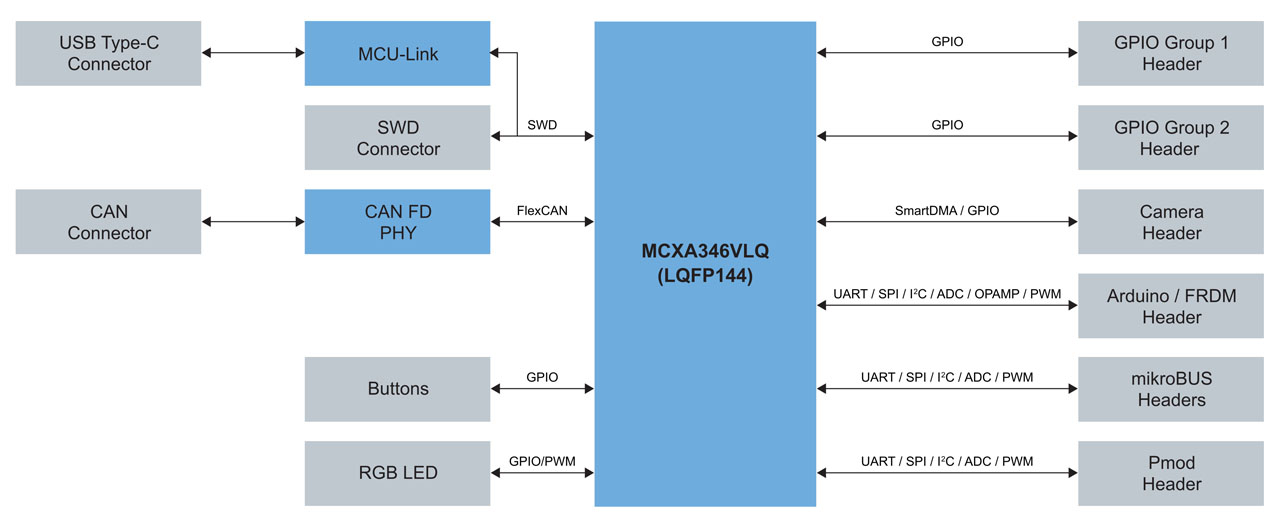
As of now, the NXP MCX-A345/A346 mixed-signal microcontrollers are available through major distributors like Digi-Key and Farnell, with single-unit prices starting around $4.5-$5 and dropping to about $2.5-$3 in high-volume orders. Some variants, like the MCX-A346 with 1 MB Flash, are listed closer to $8-$9 each in low quantities. Availability varies by region and package, with certain models in stock for immediate shipping and others on backorder with lead times up to 26 weeks. In addition, the FRDM-MCXA346 development board is available through the official website for around $19–20 per unit. Mouser lists it at $19.72 with stock available and a short 2-week lead time for larger quantities, while Arrow prices it at $20.13 each with about 100 units in stock, though bulk orders may face lead times of up to 99 weeks. You can check the product page for more information.

